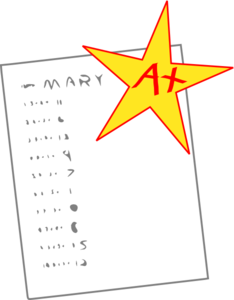Section 4-1: Time of Day
Before we look at time of day for studying, let's consider what you do right now. When are you most likely to get your studying done?
______ Early in the morning
______ Before school/class
______ During classes
______ Right after class
______ Around supper time
______ Before my usual bedtime
______ After my usual bedtime
Does your schedule vary from day to day? How does it change when you have a big project or an exam coming up?
What is Studying, Anyway?
Let's begin by defining 'studying.' This is important, because many students, especially those in middle school and high school, think that we're talking about homework. That's not actually true! Studying is actually the effort that you put into learning and remembering the concepts and material on your own. It is time spent on classwork IN ADDITION TO homework and assignments.
It's a truism that most students will not learn class material simply by completing the homework assignments. If you really want that A or B, you'll probably need to create your own study activities. Part of this lesson is to help you understand which techniques are likely to work best for you.
And unless you have a parent standing over you with a whip, no one is going to make you do this stuff either. The older you get, the more the effort falls squarely on your own shoulders. If you are in middle school right now, chances are still very good that you get a nicely typed study guide a few days before the test. Your teacher may even go over it with you. Studying for the test is done with lots of support and warm fuzzies.
If you are in high school right now, the warm fuzzies are starting to dry up and blow away in some classes. Yes, there are still teachers who announce their tests, make you a handy-dandy study guide, and take time to go over it with you in class. There are also teachers who feel you should have outgrown that crutch by now and should be more independent. A very few teachers will realize that you don't magically move from point A to point B without some effort and learning on everyone's part. These are the teachers who change how they encourage you to study through the year. They start the year by giving you the familiar study guide and lots of notice for tests. Somewhere in the middle, the study guide turns into a worksheet that gives you a scaffold. You have to fill in the missing details. Finally, by the end of the year, they may simply be announcing tests and expecting you to know what to do.
Once you hit college, you're pretty much on your own in most classes. Some institutions offer a "how to make the transition to college" class that gives you more tools to deal with the increased expectations. If there's one offered in your area, consider taking it. You'll be very glad that you did. In many college classes, the teacher hands you a syllabus on the first day that lists test dates and topics and that's the last warning you have about them. He or she may or may not go over the required reading, but rest assured that it's likely to be on the next test even if it wasn't discussed in the lecture. In short, there's a whole lot more responsibility for learning placed on your shoulders.
- When you are most awake and alert
- Right BEFORE your class
- Right AFTER your class
- Midway between meals and other major daily milestones
 physical wellbeing. You won't feel sluggish from overeating or being too tired. You won't run out of steam either.
physical wellbeing. You won't feel sluggish from overeating or being too tired. You won't run out of steam either.
(c) 2010 Sandy Fleming